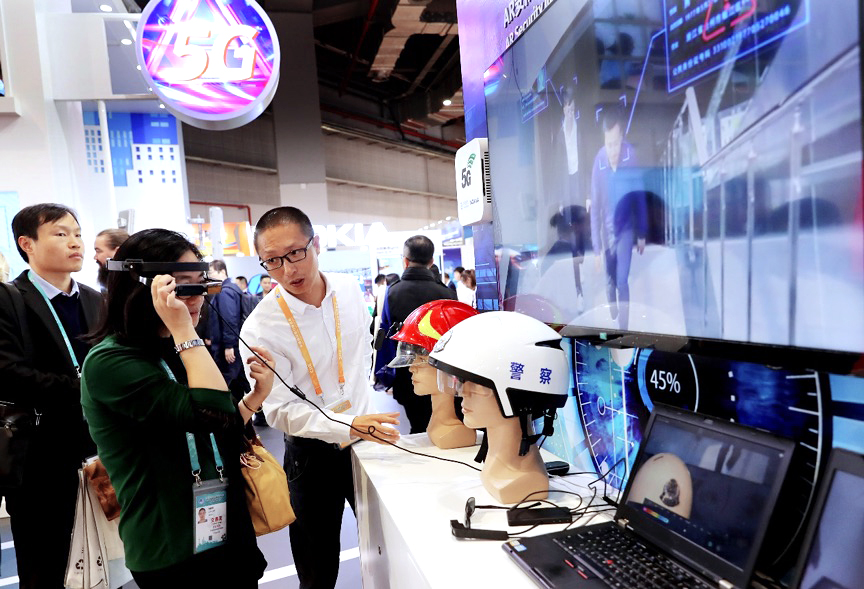Shanghai import expo promotes China’s burgeoning market to world

A visitor tries out the Nokia 5G-based AR security system at the CIIE. Photo: CIIE.ORG
SHANGHAI—Chinese President Xi Jinping pledged to open China’s markets further in his keynote speech at the opening ceremony of the inaugural China International Import Expo (CIIE) in Shanghai on Nov. 5.
CIIE is the world’s first import expo held at the national level. A total of 172 countries, regions and international organizations and more than 3,600 companies attended the exhibition.
President Xi said that China’s imports of goods and services are expected to exceed US$30 trillion and $10 trillion respectively in the coming 15 years.
This is a clear indication that China, as the world’s second-largest economy and the largest importer and exporter of goods, is a major promoter of economic globalization and free trade, said Zhang Yuyan, director of the Institute of World Economics and Politics at the Chinese Academy of Social Sciences. China’s attitude and approach are significant today in light of the rise of global trade protectionism and the unstable recovery of the world economy.
In light of ever fiercer international competition, quality capital and enterprises are increasingly scarce. To make better use of the high-quality factors of production of other countries, it is imperative to greatly relax market access standards and implement the measures already promised as soon as possible while accelerating opening up, said Li Dawei, an associate research fellow at the China Institute for Macroeconomics. Further openness can promote industrial growth, adjust market structure, strengthen competition and encourage the innovation of domestic enterprises.
Zhao Hongjun, vice dean of the School of Finance and Business at Shanghai Normal University, said that through the expo, new models of production, consumption, transportation, design and service from various countries can interact with China’s counterparts, thus promoting the technological upgrading of China’s manufacturing industry. More importantly, with the gradual reduction in China’s import tariff rate and the further culling of the negative list, more and more countries will enter the Chinese market, which is what China expects to see as the country moves towards high-quality development.
After four decades of reform and opening up, China is shifting from being a “world factory” to a “world market,” said Wang Yiwei, a professor from the School of International Studies at Renmin University of China. The import expo is an innovation in global trade, which marks the transformation of the logic of reform and opening up from “China opening up to the world” to “the world opening up to China.”
The import expo is not only a public service platform for China to offer its markets to the world, but also an opportunity for other developing countries to spread themselves and market themselves to China and the world, said Tang Wei, an associate research fellow at the Shanghai Academy of Social Sciences. In the past, China has mainly attracted investments and imported technologies and equipment from Europe, America and Japan. Since the “Belt and Road” initiative was put forward, the Chinese people have become increasingly interested in the cultures of developing countries.
One of the highlights of the import fair is the display of a large number of industrial and agricultural products from other developing countries. Countries including Indonesia, Vietnam, Pakistan, South Africa, Egypt, Hungary, Brazil and Mexico have set up special stands to show their own development achievements and unique cultures to Chinese consumers.
This indicates that the expo is by no means just an expedient for China to cope with trade frictions and protectionism. Instead, it will help other developing countries better integrate into economic globalization with their comparative advantages, serving as an important channel for all the people in the world to share the fruits of economic globalization and world economic growth, Tang said.
Zou Lei, an associate professor from the Party School of the CPC Shanghai Municipal Committee, said China will firmly support the liberalization and facilitation of trade and investment and seek “common development” rather than a “trade war.”
Taking the import expo as an opportunity, China will further open its markets to the world, which will invite more positive forecasts for the world economy in the shadow of trade protectionism, help to expand global aggregate demand and trade, and contribute to inclusive global development, thus injecting new momentum into an open world economy, Zou concluded.
(edited by YANG XUE)

 PRINT
PRINT CLOSE
CLOSE